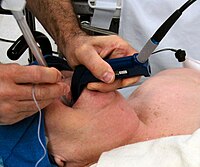
Photo from wikipedia
Background: Propofol and dexmedetomidine are routinely used in intensive care units (ICUs). Both are lipophilic, potentially leading to accumulation in adipose tissue. Limited evidence exists on what body weight to… Click to show full abstract
Background: Propofol and dexmedetomidine are routinely used in intensive care units (ICUs). Both are lipophilic, potentially leading to accumulation in adipose tissue. Limited evidence exists on what body weight to utilize in patients with morbid obesity. Objective: The purpose of this research was to evaluate the safety and efficacy of weight-based sedation with propofol and dexmedetomidine in ICU patients with morbid obesity. Methods: Retrospective review of ICU patients admitted from January 2018 to January 2020 who were sedated for ≥48 hours was performed. The primary outcome was the percentage of time within target sedation during the first 48 hours, stratified by body mass index (BMI) <40 or ≥40 kg/m2. Additional outcomes included adverse events and the infusion rate to achieve target sedation. Data were evaluated using descriptive statistics. Results: A total of 80 patients were analyzed. Patients on propofol with a BMI <40 kg/m2 were in their target Richmond Agitation-Sedation Scale (RASS) 11.7% versus 16.1% with a BMI ≥40 kg/m2 (P = .580). Patients with a BMI <40 kg/m2 on dexmedetomidine were in their target RASS 27.6% versus 10.7% with a BMI ≥40 kg/m2 (P = .053). Conclusion and Relevance: Body mass index did not significantly alter propofol target sedation attainment. However, patients with morbid obesity on dexmedetomidine demonstrated significantly less time in target sedation. An actual body weight dosing strategy of these drugs did not achieve desired target sedation for those with a BMI ≥40 versus BMI <40 kg/m2. These findings support future research on the optimal sedation dosing strategy in this patient population.
Journal Title: Annals of Pharmacotherapy
Year Published: 2022
Link to full text (if available)
Share on Social Media: Sign Up to like & get
recommendations!